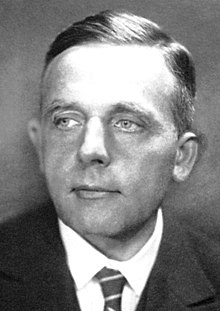Otto Heinrich Warburg
Otto Heinrich Warburg (October 8, 1883 - August 1, 1970) was a German chemist.[3] After earning his doctorate degrees in medicine and chemistry, he started to investigate how oxygen is consumed by cells in a living organism. His studies led him to identify the role of the cytochromes.[4]
Otto Heinrich Warburg | |
|---|---|
 Otto Heinrich Warburg | |
| Born | 8 October 1883 |
| Died | 1 August 1970 (aged 86) |
| Alma mater | University of Berlin University of Heidelberg |
| Known for | Oncometabolism Warburg hypothesis Warburg effect (oncology) Warburg effect (plant physiology) Warburg–Christian method |
| Awards | Iron Cross 1st class (1918) Nobel Prize in Physiology or Medicine (1931)[1] Pour le Mérite (Civil Class) (1952) Paul Ehrlich and Ludwig Darmstaedter Prize (1962) Foreign Member of the Royal Society[2] |
| Scientific career | |
| Fields | Cell biology |
| Institutions | Kaiser Wilhelm Institute for Biology |
| Doctoral advisor | Emil Fischer Ludolf von Krehl |
He won the 1931 Nobel Prize in Physiology or Medicine for the discovery of the respiratory enzyme.
Cancer
changeIn the 1920s, Warburg and his colleagues observed that tumors take up higher amounts of glucose than their surrounding tissues. Although consuming glucose is helpful for mammals because it is a nutrient, tumor cells consume too much glucose despite having working mitochondria and enough presence of oxygen. This observation is called the Warburg effect.[5]
Following this observation, Warburg and his colleagues concluded: that to kill a tumor cell, it must be deprived of glucose.[5]
References
change- ↑ "The Nobel Prize in Physiology or Medicine 1931". NobelPrize.org. Retrieved 18 February 2024.
- ↑ Krebs, H. A. (1972). "Otto Heinrich Warburg 1883-1970". Biographical Memoirs of Fellows of the Royal Society. 18: 628–699. doi:10.1098/rsbm.1972.0023. PMID 11615754.
- ↑ "Biography of Otto Warburg". The Nobel Foundation. Retrieved 2 July 2009.
- ↑ "Otto Warburg | Nobel Prize, Cell Respiration, Metabolism | Britannica". www.britannica.com. Retrieved 6 February 2024.
- ↑ 5.0 5.1 Liberti, Maria V.; Locasale, Jason W. (March 2016). "The Warburg Effect: How Does it Benefit Cancer Cells?". Trends in Biochemical Sciences. 41 (3): 211–218. doi:10.1016/j.tibs.2015.12.001. PMC 4783224. PMID 26778478.